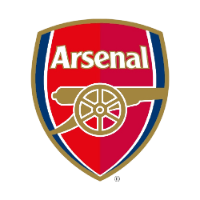
Arsenal FC
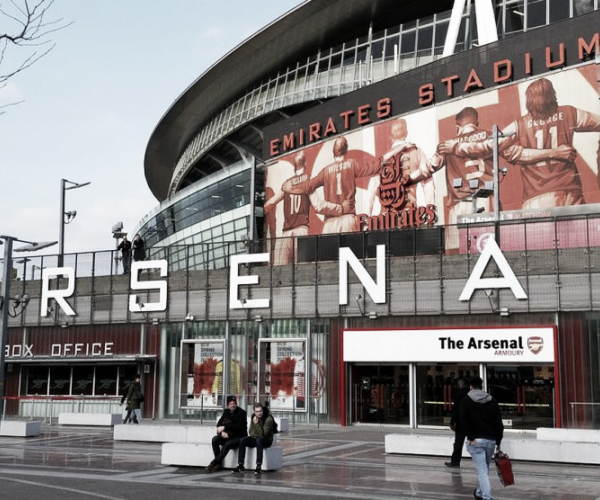
1886 Londres
It was 1886 and a group of workers at the Woolwich Arsenal Armament Factory decided to form a soccer team, which they named Dial Square, as a reference to the clock that was located at the entrance to the factory. Their first match was on December 11 of that year, when they beat Eastern Wanderers 6-0. Shortly thereafter, they would change their name to Royal Arsenal.
Shortly after the foundation of Woolwich Arsenal, Nottingham Forest collaborated with the club by sending a ball and a complete set of burgundy shirts, which started the classic Arsenal kit.
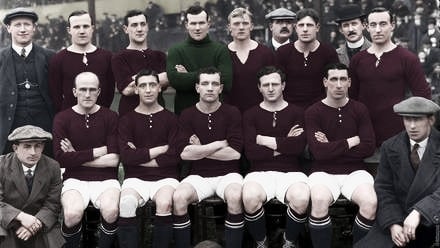
In their early years, Arsenal used various grounds as their home ground. For their first season, they played at Plumstead Common, later moving to the Sportsman Ground. In 1889, came the first appearance in the oldest tournament in world soccer and the most successful in the club's history: the FA Cup. During that season, they were crowned champions of the London Charity Cup, the Kent Senior Cup and the Kent Junior Cup. A year later, they moved back to the Invicta Ground, where they remained for almost six seasons.
As Arsenal's successes increased, the London FA accused them of professionalism (something banned at the time) and they were expelled and boycotted by several clubs in the south of England. Along with a name change and another move, Woolwich Arsenal would begin their journey through the Second Division, gaining promotion to Division One in 1903 and qualifying for the semi-finals of the FA Cup for two consecutive seasons.
In 1913, Highbury emerged as the club's historic new home, which would be renamed from Woolwich Arsenal to be known simply as Arsenal FC. At the end of World War I, Arsenal returned to the First Division, where it spent six seasons with good performances. But their chairman, Henry Norris, wanted more and in 1925 he went in search of a new manager, someone who could change the club's history forever. It was Herbert Chapman's time.
Chapman's time
Herbert Chapman had won the FA Cup and Division One twice with Huddersfield Town, so he saw Arsenal as an opportunity for a new challenge, setting out to reinvent a club that had been close to relegation the previous season. In his first season in charge, Chapman led the Gunners to the quarter-finals of the FA Cup and a runners-up spot in the First Division, their highest ever finish.
A year later, Arsenal reached the FA Cup final on 23 April 1927, a day that is remembered in English soccer history for being the first and only time the trophy left England, as Cardiff City won 1-0 at Wembley. However, three years later the rematch would come, just against Chapman's former club Huddersfield Town.
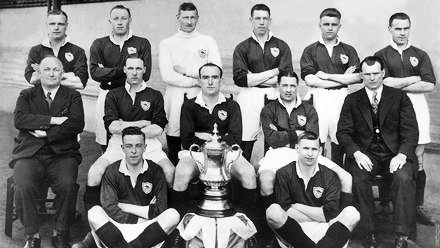
With the winning of that first FA Cup, Arsenal's domination of English soccer would begin, winning their first league title with a record 66 points. The league achievement would be repeated two years later, with the debut of the famous red shirt with white sleeves. However, in the FA Cup they were inexplicably defeated by Third Division Walsall.
Tragedy would strike at Highbury in January 1934, when severe pneumonia took the life of Herbert Chapman, aged 55. Despite this, the club continued its success, this time under former manager George Allison.
A year before the World War II hiatus, Arsenal were again crowned champions of England, their fifth league title in eight seasons.
Post-war
With the same manager, George Allison, and some players from the old team, Arsenal returned to action after World War II, but it was clear that the magic of the previous decade was in the past. With the retirements of Cliff Bastin and Ted Drake, the club struggled to avoid relegation in the 1946/47 season. Following that campaign, Allison himself would also depart, leaving his assistant, Tom Whittaker, in charge.
Arsenal won the next edition of the First Division and the great era of Joe Mercer, Allison's last legacy at the club, began. The player made 275 appearances for the Gunners before suffering a double leg fracture in a collision with teammate Joe Wade during a match against Liverpool in 1954.
A year earlier, what was to be Arsenal's last trophy for 17 years took place. The squad was beginning to age and Whittaker was unable to convince new players to join the club. After making several attempts at player-coaching, following Whittaker's death, the board made the decision in 1962 to appoint Billy Wright, known for having captained Wolverhampton and England, as well as his Arsenal fanaticism. Bob Wilson, Frank McLintock and Joe Baker joined the squad, which would reach the League Cup final twice in succession in the late 1960s, losing both times. Nevertheless, glory was close to returning to Highbury.
A special decade
The 1970s began with a great European moment, where Bertie Mee's side beat none other than Johan Cruyff's Ajax to reach the final of the Intercities Fairs Cup, where they lost 3-1 in the first leg in Anderlecht, but then won 3-0 at Highbury to lift the trophy on an unforgettable night.
In the First Division, Arsenal reached the end of the championship in a neck-and-neck battle with Leeds, with the final matchday at White Hart Lane, the home of arch-rivals Tottenham Hotspur. Ray Kennedy gave the 'Gunners' the win and, five days later, Arsenal made history by beating Liverpool in the FA Cup final, becoming the fourth team in history to win the double and only the second to do so in the 20th century.
Unfortunately, they were unable to repeat the following year as they were beaten in the FA Cup by Leeds and finished second in the league. The manager spent a small fortune to keep Alan Ball, World Cup winner with England at the 66 World Cup, but the team's dismal performance led to Terry Neill taking over in 1976.
Pat Jennings arrived from Tottenham Hotspur and Malcolm MacDonald from Newcastle, who together with the appearances of youth players Liam Brady and Frank Stapleton, managed to return Arsenal to the top half of the table.
In FA Cup, they managed to play three consecutive finals ('78, '79 and '80), two of them with defeats, except for the one corresponding to 1979, known as "The Five Minute Final".The Five Minute Final", since in the final, Manchester United managed to equalize 2-0, but Alan Sunderland cut the comeback and gave the trophy to the'Gunners'.
The years went by and the centenary year arrived. In May 1986, the club appointed its former player, George Graham, as its manager, amidst a context where its great figure, Liam Brady, had left, and after being named best player in three consecutive seasons, he left for Juventus, along with the departure of Frank Stapleton to Manchester United.
Graham's time at the club was famous for the great discipline he imposed on his players, both on and off the field. The coach's idea, moreover, was to build a four-man defense that could serve the team for more than a decade, with young captain Tony Adams as the key player. On offense, David Rocastle, Paul Merson and Alan Smith became the 'Gunner' threat.
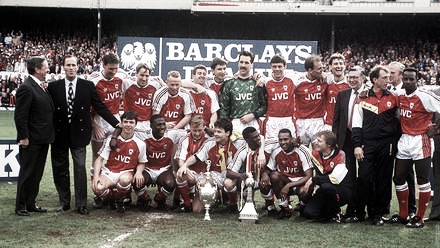
Arsenal took the 1988/89 season by storm on the final day, but the following year they managed a disappointing fourth place in the table, which made it clear that it was time to turn to the market for new players. Anders Limpar, a Swedish midfielder, joined the club, along with a goalkeeper from Queens Park Rangers who would later go down in English soccer history: David Seaman. The signings had an immediate effect, with Arsenal winning the championship, losing only one game in the campaign and despite a two-point suspension for a mass brawl against Manchester United.
Again, the Londoners were unable to build on the success and again found themselves in fourth place. Despite the league becoming an elusive trophy for Arsenal, the celebrations moved to the knockout tournaments, where they claimed an FA Cup and League Cup double in 1993, along with their second continental tournament, which they won by beating Parma in the final of the European Cup Winners Cup.
Ten months after that victory, Graham was sacked as Arsenal manager. It was time for a name that forever marked the history of English soccer.
The Wenger Era
An unknown Frenchman was announced as Graham's replacement: Arsene Wenger. Although he had achieved very good numbers at Monaco, he was still a relatively unknown name to the soccer world in general, as well as becoming the first manager of the club whose origin was not from the United Kingdom.
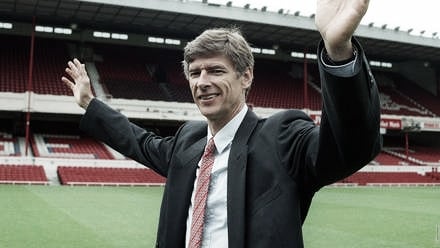
In his first full season in charge, Arsenal reversed an 11-point deficit to Manchester United and were crowned champions of the renamed Premier League, two games before the end of the season, while two weeks later they would win the first double of the Wenger era with victory in the FA Cup final.
Wenger's revolution came in every sense, not only in soccer. The Frenchman implemented new training systems and diets for the players, showing meticulous work in the construction of his squad, to which players of the stature of Patrick Vieira, Emmanuel Petit and Dennis Bergkamp were added.
In August 1999, perhaps the most significant signing in recent decades arrived: Thierry Henry. The French striker arrived after winning the World Cup with his national team, and had problems adapting to the tough game of the Premier League, especially after an eight-game dry spell on his debut. However, he found his best form and reached 26 goals that season.
In the new millennium, for the 2001/02 season, Arsene Wenger's side achieved another double by finishing seven points clear of Liverpool in the Premier League and beating Chelsea in the FA Cup. They would win the oldest tournament again in the following campaign, but the league eluded them, although not for long, because in 2003/04 they would once again go down in soccer history.
"The Invincibles
49 games played, 36 wins and 13 draws. The 2003/04 season was engraved in the memory of all football fans with the Arsenal of "The Invincibles", who were crowned champions undefeated, an achievement that could never be repeated in England in the following years. Possession play and high-flying soccer, along with defensive solidity, were the cornerstones of this timeless team.
.jpg)
Arsene Wenger led the likes of Jens Lehmann, Patrick Vieira, Robert Pires, Fredrik Ljunberg, Dennis Bergkamp and Thierry Henry to the Premier League golden trophy, an exclusive award presented to them in recognition of their unbeaten run in the Premier League.
Having conquered England, Europe was the big goal, and they came close two years later, when they reached the final of Paris 2006, where they faced Barcelona, but were defeated by the Catalan team. In July of that year, they moved to their new home, the Emirates Stadium, after 93 years at Highbury.
.jpg)
It took nine years for Arsenal to win another major trophy, as it was only in May 2014, after beating Hull City, that they won the FA Cup, an achievement they repeated the following season, with Aston Villa as their opponents, becoming the most successful club in the history of the club.Manchester United would match that achievement the following year and Arsenal would regain it in 2017. In addition, Wenger's reputation would grow after he became the first manager to win seven FA Cups.
End of an era
After 22 years at the helm, on April 20, 2018, Arsene Wenger would announce his departure from the club. His last home game was a 5-0 win against Burnley, where he was greeted with a standing ovation from all the spectators, while the final farewell would be against Huddersfield Town, as away, the last of the Wenger era.
Unai Emery was announced as Arsene Wenger's replacement, the second to be born outside the UK. In his first season, Arsenal finished fifth in the Premier League and were runners-up in the UEFA Europa League. However, his more direct style never won over supporters and, after a home defeat to Eintracht Frankfurt in the 2019/20 UEFA Europa League group stage, he was sacked.
Freddie Ljunberg was chosen as interim coach, while on December 20, 2019, former captain Mikel Arteta would become the formal replacement. After his experience as Pep Guardiola's assistant at Manchester City, Arteta is the one looking to bring back the glory years for Arsenal.
Biography by Lucas Romeo.








































